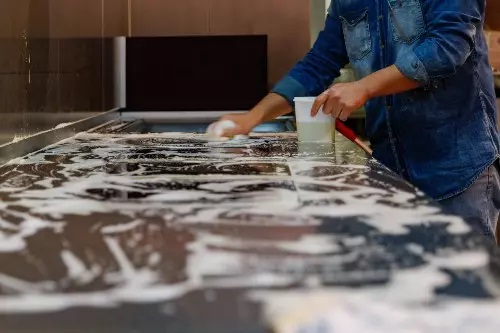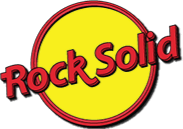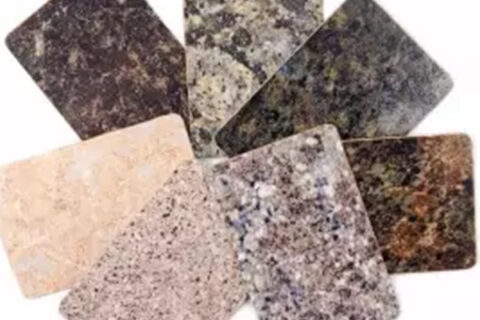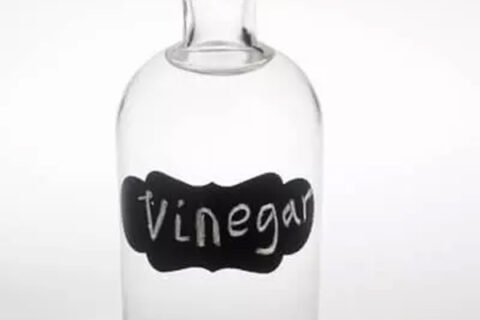Can You Use Bleach on Granite Countertops?
Bleach is a very useful product that can kill a wide variety of pathogens, including salmonella and E. coli. But is it safe for granite countertops? Read on to learn the potential risks associated with using harsh chemical cleansers on granite, along with some tips for safely cleaning and disinfecting your natural stone countertops.
What Exactly Is Bleach?
Bleach is a generic term for any chemical product which is used domestically or industrially to remove the color from a fiber or fabric or to clean and remove stains through a process called “bleaching.” In general, it often refers to a diluted solution of sodium hypochlorite, also known as “liquid bleach.” In addition to eliminating stains, bleach is known for its ability to sterilize surfaces by killing potentially harmful pathogens which can cause severe illness when ingested.
Is It Safe to Use Bleach on Granite?
Technically, bleach can be safe for granite countertops as long as they are properly sealed and the bleach is heavily diluted with water. The bleach must also be thoroughly rinsed immediately after use to prevent the chemicals from damaging the sealant and underlying granite.
With that said, there is always a risk anytime you use a harsh chemical cleaner on your granite countertops. With this in mind, it’s generally best to avoid bleach and use a safer alternative to clean and disinfect your granite surfaces, especially if they haven’t been re-sealed in a while.
Cleaning and Disinfecting Granite

Although granite almost always comes sealed, this only makes it resistant to stains and not 100-percent stain-proof. It’s very important to quickly wipe up any and all spills, especially wine, fruit juices and oil before they have a chance to permeate the stone and flaw the granite.
Ideally, you should blot the spills instead of wiping them, since the latter method can actually work them into the tiny crevices in the countertop. Use microfiber rags and towels if possible. Never use any type of rough cleansers or scouring powders that can damage the sealant and granite. You should also avoid acidic homemade cleansers containing vinegar or lemon. Essentially, any type of harsh acidic or abrasive cleanser may strip away the sealant, which is essential for keeping your granite countertop germ-free, clean and food-safe.
With that said, granite is generally impenetrable to potentially harmful microorganisms. Warm water and dish cleaner is generally enough to clean granite counters. You can also make your own disinfecting solution by combining a 50-50 mixture of water and isopropyl alcohol. Add the solution to a spray bottle and spritz it onto the counters. Wait three to five minutes; then, rinse the countertop with water and dry the granite with microfiber fabric.
Protecting Your Granite
As one of the strongest and most durable materials used for kitchen countertops, granite has a well-deserved reputation for lasting beauty. That said, it’s not indestructible. Just like virtually every other type of solid surface, granite will chip when subjected to a hard impact from a heavy pot or pan. It will also stain when the stone is exposed to problematic liquids. Because they can strip away the protective sealer, harsh cleansers can increase the likelihood of problems, especially if you use them frequently.
To avoid accidentally damaging your countertops, always be sure to wipe up any liquids right away and make sure your granite is protected by a high-quality sealer. You should also avoid dropping or slamming down pots and pans, especially near the edges of the counters. When possible, use potholders, trivets and other barriers to help protect your granite from heat damage.
To avoid problems with your granite kitchen countertops, it’s important to have them installed by a seasoned, local countertop contractor. Rock Solid has gained a well-earned reputation for being the most reliable granite counters company. An employee-owned company, we do all the work ourselves without outsourcing critical tasks to subcontractors. When you work with our knowledgeable experts, you can expect flawless countertops that look gorgeous and stand the test of time. Contact us today for a free estimate!
For more information on cleaning granite countertops, check out our blog on How to Remove Stains from Granite.


